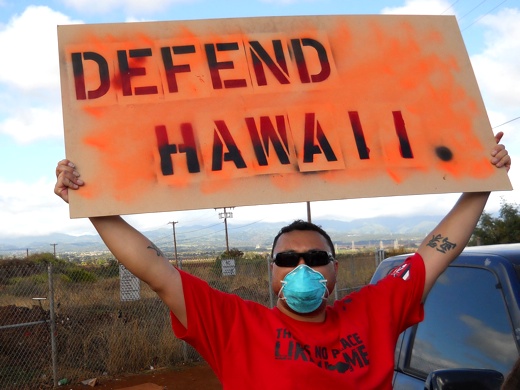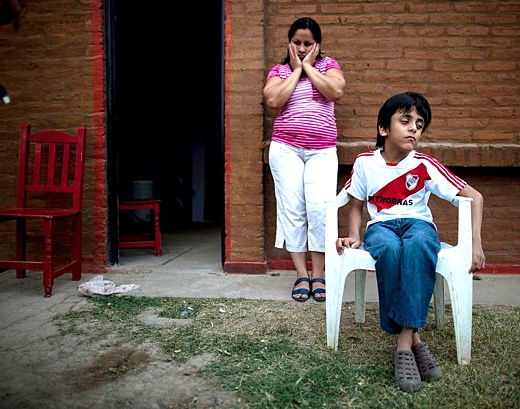SOURCE: Shannon Rudolph (shannonkona@gmail.com)
SUBHEAD: Court strikes down ban on most genetically engineered crops as Big-Ag undermines will of Hawaiians.
SUBHEAD: Court strikes down ban on most genetically engineered crops as Big-Ag undermines will of Hawaiians.
By Staff on 26 November 2014 for Center for Food Safety -
(http://www.centerforfoodsafety.org/press-releases/3628/chemical-corporations-undermine-the-will-of-the-people-of-hawaii-county#)

Image above: demonstration against Sygenta's Kunia Gate on Big Island on 7/13/12. From (http://www.dougnote.com/2012/12/aina-fest-to-celebrate-active-year.html).
U.S. Magistrate Judge Barry Kurren today ruled Hawaii County Ordinance 13-121 invalid because the subject matter was one that must be regulated at the state level. The ordinance, passed by the County Council 6-3 in November 2013, would have banned most genetically engineered (GE) crops from being grown on the Big Island, with the exception of papaya.
Center for Food Safety and Earthjustice helped the county defend the law against the Biotechnology Industry Organization – the association for biotech companies like Monsanto and Dow Chemical.
The decision concluded that state “preemption” of the county ordinance is implied by state plant laws, despite the fact none of them even mention genetically engineered crops or were intended to regulate them. The court also refused the nonprofits’ request to send the state law question to the Hawaii Supreme Court to decide, despite being important state law questions of first impression.
Finally, the court rejected the chemical companies’ arguments that county and state regulation of commercialized genetically engineered crops was prohibited by federal law, but concluded federal law did prohibit regulation of some, but not all, experimental plantings.
The decision follows on the heels of a similar decision by the same judge regarding Kauai County Ordinance 960, a decision currently being appealed.
Additionally, the residents of Maui County just passed a ballot initiative to halt GE crop production until public safety tests can be conducted. That initiative is also being challenged by the biotech industry in court.
"Hawaii Island is a unique and important place,” said Nancy Redfeather, an organic farmer on the Big Island. “I am deeply disappointed that the court would agree with the chemical companies' arguments, stripping us of our right to make local agricultural decisions.”
Earthjustice attorney Paul Achitoff commented:
“Given Judge Kurren’s decision invalidating the Kaua`i County ordinance this ruling comes as no surprise. We believe he was wrong in concluding in both cases that Hawai`i law preempts county regulation of genetically engineered crops, and we’re confident the Court of Appeals will agree with us.”“This decision is legally flawed and unfortunate, but the movement to save Hawai`i from becoming a poisoned paradise will not be deterred,” said George Kimbrell, senior attorney for Center for Food Safety. “We will continue to stand and defend the will of Hawaiian people to protect themselves, their local farms, and their environment from the harms of genetically engineered crops and their pesticides.”
Citing public health and environmental concerns, Ordinance 13-121 (previously Bill 113) passed the County Council with large public support. The ordinance banned the growing of new genetically engineered crops on the island. It also prohibited open-air testing of GE crops and included a $1000 per day fine for violations. The bill exempted crops that are already grown on the island, like the Rainbow papaya.
Large biotechnology companies such as Monsanto and Syngenta experiment with genetically engineered crops in Hawai`i because it offers year round growing conditions. Most of these crops are engineered to resist herbicides and pesticides.
Testing these crops means repeated spraying of dangerous chemicals near neighborhoods, schools, and waterways. In 2013 alone there were 1124 field test sites; California only hosted 184 sites. Across the state, residents are seeking to halt the practice.
Is Judge Connected to GMO Company?
By Jon Rappoport on 14 November 2014 for NoMoreFakeNews.com -
(http://jonrappoport.wordpress.com/2014/11/24/is-judge-in-maui-gmo-case-connected-to-monsanto/)

Image above: Faye Watenabe Kurren, former President, Tesoro Hawaii; President & CEO, Hawaii Dental Services (HDS); Chair, University of Hawaii Foundation Board of Trustees; Trustee, The Nature Conservancy; Director, First Hawaiian Bank; Director, First Insurance Company of Hawaii, Inc. She is a graduate of Punahou School; William S. Richardson School of Law graduate, 1979 (classmate of former Bishop Estate trustee Gerard A. Jervis and Judge Reynaldo D. Graulty); wife of Judge Barry Kurren. From (https://sites.google.com/site/thepunahoualbum/home/faye-watanabe-kurren) and (https://sites.google.com/site/justicevsharmonwitnesses/home/faye-w-kurren).
After the citizens of Maui just voted to stop Monsanto and Dow from further GMO development, Monsanto filed suit.
Barry Kurren is the US federal magistrate overseeing the court battle between Maui and Monsanto.
Judge Kurren’s wife, Faye, is the past president of the University of Hawaii Foundation, which is the fund-raising arm of the University.
On September 6, 2011, Monsanto donated $500,000 to the University to establish a Monsanto Research Fellows Fund for “plant science.”
On July 8, 2010, Monsanto gave $100,000 to University for its scholarship fund.
Judge Kurren’s wife, Faye, has also served as a trustee of the Nature Conservancy, which has a long-established relationship with Monsanto. From the Conservancy’s website: “Monsanto has supported the Nature Conservancy for years.”
Presently, Kurren’s wife is a board member of the First Hawaiian Bank. On its website, there is this quote of “GMO praise” (page 4 of 6):
“Kauai is an ideal research laboratory for the seed corn industry…there are currently five parent seed corn operations on the island: [biotech GM giants] Pioneer Hi-Bred…Syngenta, Dow Monsanto, and BASF. Dow Agrosciences recently leased 3,400 acres of former sugar land…”These academic, corporate, non-profit, bank connections are part of Hawaii’s overall social and political networks, which form a “community of interest.”
What would happen if Judge Kurren suddenly ruled against Monsanto? How many shocks would ripple out into protected interests? How many social friendships would suddenly collapse? How embarrassing would it be for Faye Kurren?
How much easier would it be to “honor” those connections and friendships and moneyed interests by siding with Monsanto?
See also:
Where Big-Ag is taking Hawaii
SUBHEAD: Photos from Argentina’s farms, documenting an agrochemical plague created by Monsanto.
By Natacha Pisarenko on 21 October 2013 for the Denver Post -
(http://blogs.denverpost.com/captured/2013/10/21/photos-argentina-agrochemicals/6446/)

Image above: Silvia Alvarez leans against her red brick home while keeping an eye on her son, Ezequiel Moreno, who was born with hydrocephalus, in Gancedo, in Chaco province, Argentina.
Alvarez blames continuous exposure to agrochemical spraying for two miscarriages and her son's health problems. Chaco provincial birth reports show that congenital defects quadrupled in the decade after genetically modified crops and their related agrochemicals arrived. From original photo essay.
American biotechnology has turned Argentina into the world’s third-largest soybean producer, but the chemicals powering the boom aren’t confined to soy and cotton and corn fields.
They routinely contaminate homes and classrooms and drinking water. A growing chorus of doctors and scientists is warning that their uncontrolled use could be responsible for the increasing number of health problems turning up in hospitals across the South American nation.
In the heart of Argentina’s soybean business, house-to-house surveys of 65,000 people in farming communities found cancer rates two to four times higher than the national average, as well as higher rates of hypothyroidism and chronic respiratory illnesses. Associated Press photographer Natacha Pisarenko spent months documenting the issue in farming communities across Argentina.
Most provinces in Argentina forbid spraying pesticides and other agrochemicals next to homes and schools, with bans ranging in distance from 50 meters to as much as several kilometers from populated areas.
The Associated Press found many cases of soybeans planted only a few feet from homes and schools, and of chemicals mixed and loaded onto tractors inside residential neighborhoods.
In the last 20 years, agrochemical spraying has increased eightfold in Argentina- from 9 million gallons in 1990 to 84 million gallons today.
Glyphosate, the key ingredient in Monsanto’s Round Up products, is used roughly eight to ten times more per acre than in the United States.
Yet Argentina doesn’t apply national standards for farm chemicals, leaving rule-making to the provinces and enforcement to the municipalities. The result is a hodgepodge of widely ignored regulations that leave people dangerously exposed.
Click on link to see photographic essay of the impact of GMOs and glyphosate (RoundUp) on the local rural people of Argentina.
.
2 comments :
Are we surprised judges are corrupted? What happened to democracy?
Ready to do something different? How about demanding this case by tried by a common law grand jury rather than allowing a guy in a black robe decide?
https://www.nationallibertyalliance.org
Post a Comment